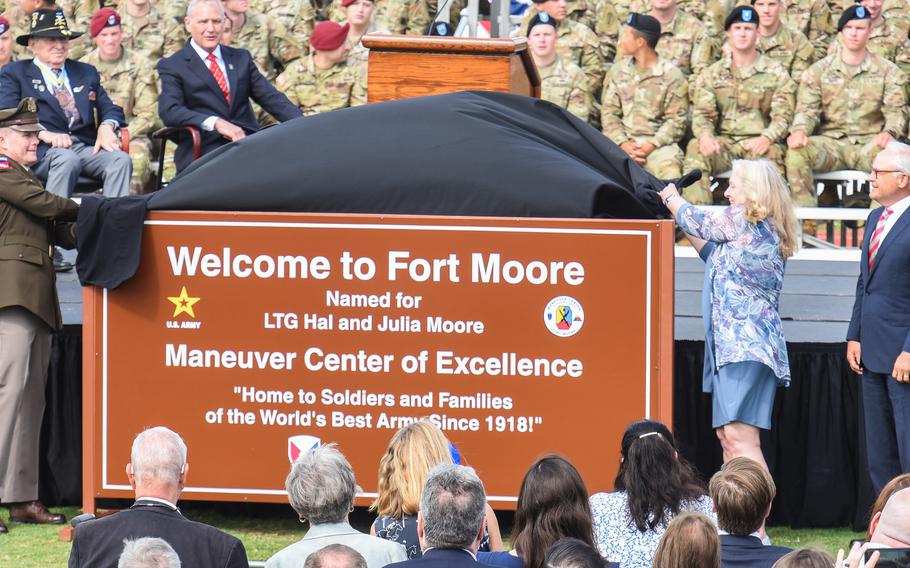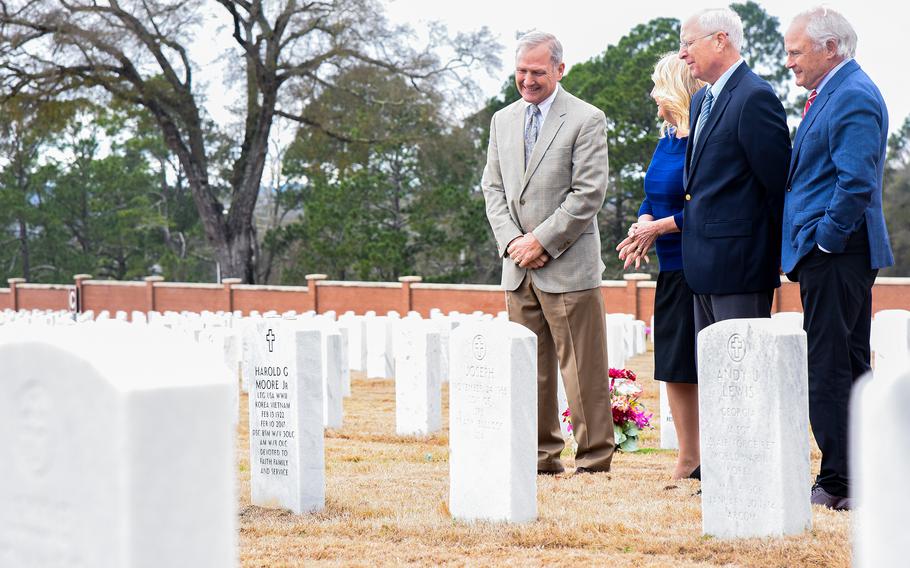
A side-by-side comparison of the current entrance to Fort Moore and the old entrance sign when it was called Fort Benning. (Corey Dickstein/Stars and Stripes)
ATLANTA — Defense Secretary Pete Hegseth has hinted he would like to change the name of Fort Moore back to Fort Benning.
The former Army National Guard infantry officer and Fox News weekend host referred to Fort Liberty, N.C., and Fort Moore, Ga., as Fort Bragg and Fort Benning, respectively, in remarks to reporters as he entered the Pentagon last month on his first day as defense secretary.
This week, he made good on President Donald Trump’s campaign promise to restore the name Fort Bragg by issuing an order to rename Fort Liberty for a different Bragg — World War II Silver Star recipient Pfc. Roland L. Bragg, instead of its longtime namesake, Confederate Gen. Braxton Bragg.
“Bragg now,” Hegseth wrote on his personal X account after issuing that order aboard a Germany-bound Air Force C-17 cargo jet Monday evening. “More to come.”
But the children of Army Lt. Gen. Hal and Julie Moore, for whom Fort Moore was renamed in 2023, urged Hegseth to consider their parents’ legacy before removing their name from the post.

Army Maj. Gen. Curtis Buzzard, the commander of the Maneuver Center of Excellence, and Julie Moore Orlowski, Hal and Julie Moore’s daughter, unveil the new welcome sign for Fort Moore, Ga., during a ceremony on May 11, 2023, to mark the change in name of the former Fort Benning to Fort Moore. (Corey Dickstein/Stars and Stripes)
“Hal and Julie Moore still represent the values and culture and competencies that Secretary of Defense [Hegseth] is saying he wants in our force and in the [Defense] Department,” said Dave Moore, Hal and Julie’s youngest child who retired from the Army as colonel in 2011 after serving tours in Panama, Iraq and Afghanistan. “The combination of Hal and Julie Moore as namesake gives the Department of Defense the opportunity to embrace honor, integrity, competency, selfless service, and gives the Department of Defense the opportunity to reinforce their support for Army families and Army spouses.
“I think it’s a win for the Department of Defense if they do nothing.”
Hal Moore was a revered warrior who served in the Korean War and earned the Distinguished Service Cross in Vietnam for lifesaving heroics during the war’s first major battle before rising to a three-star general. His wife, Julie, meanwhile held their family together through more than two dozen moves and served as an activist for Army families. The daughter of an Army officer, she was a life-long volunteer for the American Red Cross, and she is also credited with revamping the Pentagon’s casualty notification process to ensure such news was delivered by uniformed Army officers, after she witnessed families being notified of Vietnam casualties by telegrams delivered by taxi drivers in Columbus, Ga. Both Moores are buried on the Georgia Army post.
Hegseth has not yet issued an order to rename Fort Moore, and officials said this week that they did not know if such an order would come.
Under current law, Hegseth cannot name Defense Department assets or properties for individuals tied to the Confederacy. But Hegseth could potentially revert the installation back to Fort Benning, so long as it was in honor of another individual with no ties to the Confederacy, unlike its former namesake, Confederate Gen. Henry Benning.
In a 2022 report, the panel that oversaw the name-changing process included several Bennings who were nominated for consideration for the post’s name. However, only one appears to have Army ties — Cpl. Fred G. Benning, who was a World War I veteran awarded the Distinguished Service Cross — the Army’s second highest award for battlefield valor — for heroic actions on Oct. 9, 1918, as an 18-year-old fighting in France, according to service records.
Army officials declined comment on the issue Friday and referred questions to Hegseth’s office. A spokesperson for Hegseth cited the secretary’s previous statements on installation names.
Hegseth has said the names should be reversed because they tie generations of soldiers together.
“It’s about the connection to the community, to those who served, and we’re not, as the president has said and I’ve said as well, we’re not done there. There are other bases that have been renamed that erodes that very same legacy,” Hegseth said Tuesday in Germany. “There’s a reason I said Bragg and Benning when I walked into the Pentagon on day one. But it’s not just Bragg and Benning. There are a lot of other service members who have connections, and we’re going to do our best to restore it.”
Some veterans online cheered Hegseth’s move on Monday to revert Fort Liberty to Fort Bragg, and some called upon him to do the same with Fort Moore, which is home to the Army’s infantry and armor training.
Others said it would be disrespectful to Hal Moore’s legacy to strip his name from the post.
Dave Moore, a 1984 graduate of the U.S. Military Academy at West Point, N.Y., said he understood those who felt like the old name should be returned, especially as someone who spent time as a child on the post and then served there as a soldier. But he argued the Moore name is a better fit for the installation than Benning, who was a staunch secessionist, an ardent slavery defender and never served in the U.S. military.
Moore likened the issue to the adamant opposition by some at West Point to women being admitted to the academy before the first class of female cadets in the graduating class of 1980.
“The old guys ... [were] saying that they didn’t belong there, that they didn’t deserve to be there, but now we’re 40 years on, and it’s a benefit to the Army to have women there,” Dave Moore said Friday. “So, I would ask those who don’t support the name changes to look at what we’re trying to create here, and that value statement for Hal and Julie Moore was about character, the values we want the Army to represent, and it was also about recognizing the importance of Army families and Army spouses to military readiness.”
Moore said he did not oppose women’s attendance at the academy.
Moore’s older brother Steve Moore, who also served 20 years in the Army after graduating from West Point, said it would be a step backward to “change it to a generic person with the name Benning.”
Some in Congress have also signaled they oppose such moves.
Sen. Jack Reed, D-R.I., said this week after Hegseth’s Fort Bragg order that reverting Army post names to their former names using new namesakes without Confederate ties was a “cynical maneuver.”
“Secretary Hegseth has not violated the letter of the law, but he has violated its spirit,” said Reed, the top Democrat on the Senate Armed Services Committee and its former chairman. “Worse, he has insulted the Gold Star families who proudly supported Fort Liberty’s name, and he has dishonored himself by associating Private Bragg’s good name with a Confederate traitor.”
Meanwhile, Rep. Mike Collins, R-Ga., in a post on X immediately cheered Hegseth’s move on Fort Bragg.
“Can we do Benning, please,” he wrote.
For the Moore family, seeing their parents’ names removed from the Army post that they have deep connections to would be disheartening, but it would not take anything away from their parents’ legacy.
“I think it would be an indicator that the Department of Defense has a different priority than what Hal and Julie Moore represent and can offer, and that would be a disappointment,” Dave Moore said Friday. “I don’t think it’s a vote against Hal and Julie Moore. I think it’s more a vote for a policy promise and some other political priority.
“If it happens, I’m not going to cry about it. It’s just sort of disappointing. It’s sad, but the sun will rise.”
Stars and Stripes reporter Matthew Adams contributed to this report.

The children of Lt. Gen. Hal and Julie Moore, for whom Fort Benning was renamed, visit their parents’ grave on the Georgia Army post on Feb. 17, 2023. Pictured from left to right are Dave Moore, Cecile Moore Rainey, Steve Moore and Greg Moore, who along with their sister Julie Moore Orlowski, nominated their parents as the new namesakes for Fort Benning after Congress began the process to rename installations named for Confederate generals in 2021. (Corey Dickstein/Stars and Stripes)